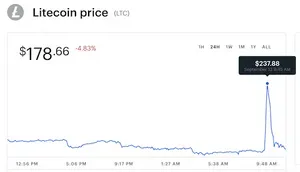pNetwork loses $12 million to a bug
Supply chain attack drains $3 million from SushiSwap
Head of Product for major NFT platform, OpenSea, is asked to resign following allegations of NFT insider trading
GTV Media Group, a media company operated by Steve Bannon and Guo Wengui, pay $539 million settlement over ICO
GTV Media Group is a media company co-founded by Steve Bannon and Guo Wengui, both figures in the American far right who have close ties to Donald Trump.
- "SEC Charges Three Media Companies with Illegal Offerings of Stock and Digital Assets", U.S. Securities and Exchange Commission
Fake press release dupes media outlets into reporting that Walmart will begin accepting Litecoin
SEC charges Rivetz Corp. and related entities for $18 million ICO
- "SEC Charges Issuers and CEO for $18 Million Illegal Securities Offering", U.S. Securities and Exchange Commission
El Salvador adopts Bitcoin as legal tender
So has El Salvador itself, assuming Bukele is telling the truth about his many claimed Bitcoin purchases. As of December 2022, Nayib Bukele has lost more than $67 million on those investments.
C.R.E.A.M. Finance exploited again, this time for $25 to $30 million
xToken loses another $4.5 million in second hack of the year
Scammers posing as Bored Ape Yacht Club founders scam NFT collector Sohrob Farudi out of $800,000
Scammers posing as OpenSea support staff steal $480,000 from NFT collector Jeff Nicholas
- "The NFT scammers are here", The Verge
Liquid Global cryptocurrency exchange hacked for $90 million
A week after the hack, FTX extended a $120 million loan to the platform. In April 2022, FTX formally acquired Liquid for an undisclosed amount.
DAO Maker project exploited for more than $7.3 million
$611 million is stolen from Poly Network in one of the largest cryptocurrency heists to date
"Women-led" NFT project, "Fame Lady Squad", turns out to be a bunch of dudes
Poloniex settles with the SEC for more than $10.3 million
The US-based Poloniex was acquired in 2018 by Circle, then in late 2019 by an investment group that included Justin Sun. Sun moved Poloniex to the Seychelles and closed U.S. operations upon acquiring the platform.
Blockchain Credit Partners forfeits over $12.8 million in SEC agreement
The respondents agreed to a $12.8 million forfeiture of ill-gotten profits, plus a combined $250,000 penalty. The case marked a first from the SEC in the decentralized finance space.
DeviantArt releases software to detect infringement of artwork on NFT marketplaces... because the NFT marketplaces won't
Uulala and related individuals settle with SEC for a total of $543,000 in fines
Flash loan exploit empties $25 million from Popsicle Finance
Russian Ponzi scheme collapses after defrauding investors of around $95 million
An attacker steals coins by giving out coins of their own
Norton Antivirus now sneakily installs a crypto miner on your computer so you can mine crypto (and give some to them)
Coinbase said its USD Coin would be fully backed 1-1 with USD. It isn't.
StableMagnet makes off with $27 million in rug pull
A not-so-stable stablecoin, titan, comes crashing down
Hacker nets $6.3 million in Belt Finance exploit
- "Belt Finance loses millions in latest BSC-based DeFi exploit", Cointelegraph
- "Belt", Rekt
SEC begins case against those involved in alleged $2 billion BitConnect fraud
- " SEC Charges U.S. Promoters of $2 Billion Global Crypto Lending Securities Offering", U.S. Securities and Exchange Commission
- SEC v. BitConnect
"Trivial" bug costs BurgerSwap $7.2 million
Attackers drain $3 million from BOG liquidity pool
Rumors swirl around what actually happened with DeFi100: a rug pull, or a simple website defacement?
$45 million stolen from PancakeBunny Finance
FinNexus "hacked" for $7.6 million in likely inside job
The theft appeared to have been enabled by someone who had access to the project's admin key, and was able to change the token owner to an address where they then minted and withdrew tokens, amounting to a $7.6 million theft.
Hacker drains $10.85 million from bEarn Fi
$24.5 million emptied from xToken platform
Rari Capital exploited for $15 million
Value DeFi hacked twice in one week, three times in six months
Value DeFi hacked for the second time in six months
A bug in the Spartan Protocol platform allows an attacker to steal around $30 million
- "Spartan Protocol exploit results in loss of $30M", Cointelegraph
An attempt to incorporate NFTs throws a wrench into a $40 million domain name auction
.link, .help, .game, and even .christmas. The April auction grossed more than $40 million, but as of mid-December the transactions had not been completed. This is because UNR attempted to add some marketing flair to the auction by including NFTs for each of the TLDs, to go to the auction winners. ICANN, the group responsible for much of the domain world, objected to and withheld consent for the transactions, writing "we sought to understand the impact of the transactions on the Domain Name System ('DNS'), including how Non-Fungible Tokens (NFTs) created on the Ethereum Name Service (ENS) were being used, and were involved in the transactions. ICANN repeatedly asked UNR for documentation or other information related to NFTs in the hopes that UNR would provide fulsome and complete responses."- NFTs trip up Uniregistry's top level domain auctions, Domain Name Wire
Uranium Finance is drained of $50 million in hack
German museum accidentally burns two valuable Cryptopunks NFTs in copy-paste error
CEO of Turkish crypto exchange Thodex apparently makes off with $2 billion in investments
$80 million taken from EasyFi lending platform
Africrypt investors disappear with $3.6 billion of investor funds
FTX loses $800 million to MobileCoin market manipulation
During the October 2023 criminal trial of FTX founder and CEO Sam Bankman-Fried, he gave more detail on how the exploit took place, and admitted that he personally had disabled FTX's automatic liquidation systems for this account. Though he intended to closely monitor the account to prevent any losses to FTX, he said that it was actually his actions that allowed the trader to drain such a massive quantity of assets from the exchange.
Prosecutors alleged that Bankman-Fried later had his cryptocurrency trading firm, Alameda Research, shoulder the loss, saying that he'd hoped it would be less visible on Alameda's balance sheets than on FTX's.
- "The FTX trial, day fourteen: Same events, new stories", Newsletter by Molly White
Creators of "Turtledex", a project offering decentralized storage, make off with $2.5 million
Social token platform Roll hacked for $5.7 million
A headline-making $69 million NFT sale looks an awful lot like a publicity stunt
- "Metakovan, the mystery Beeple art buyer, and his NFT/DeFi scheme", Amy Castor
- "JPG File Sells for $69 Million, as 'NFT Mania' Gathers Pace", The New York Times









































